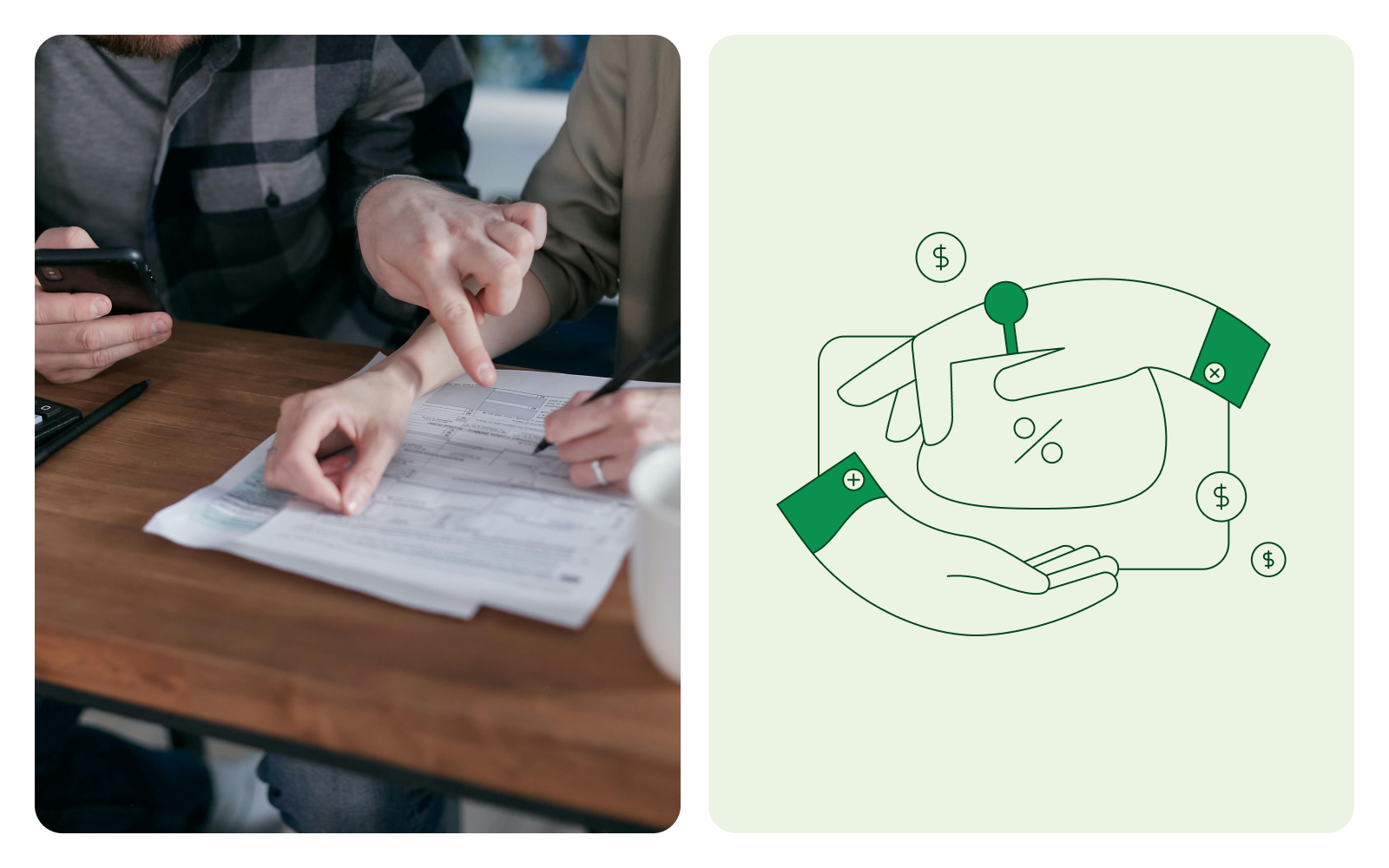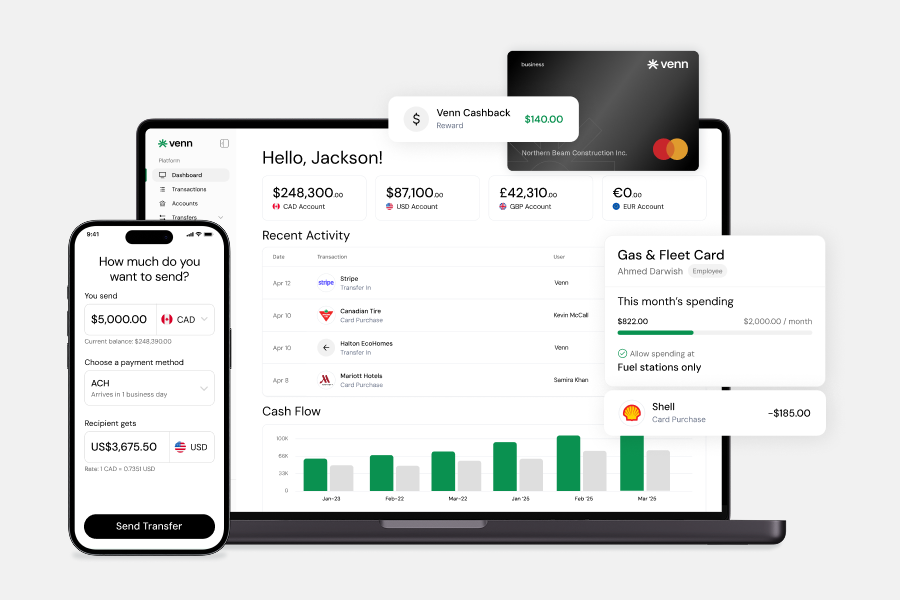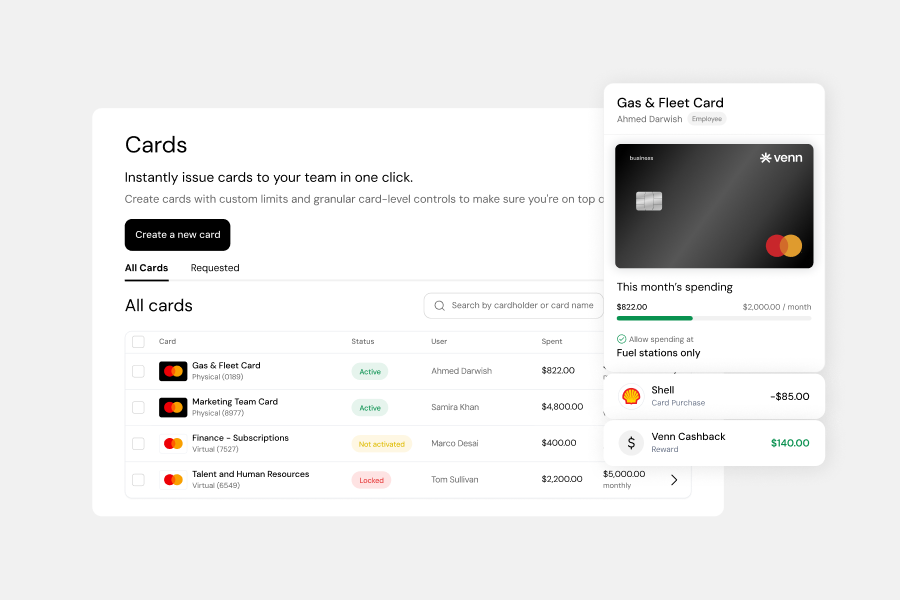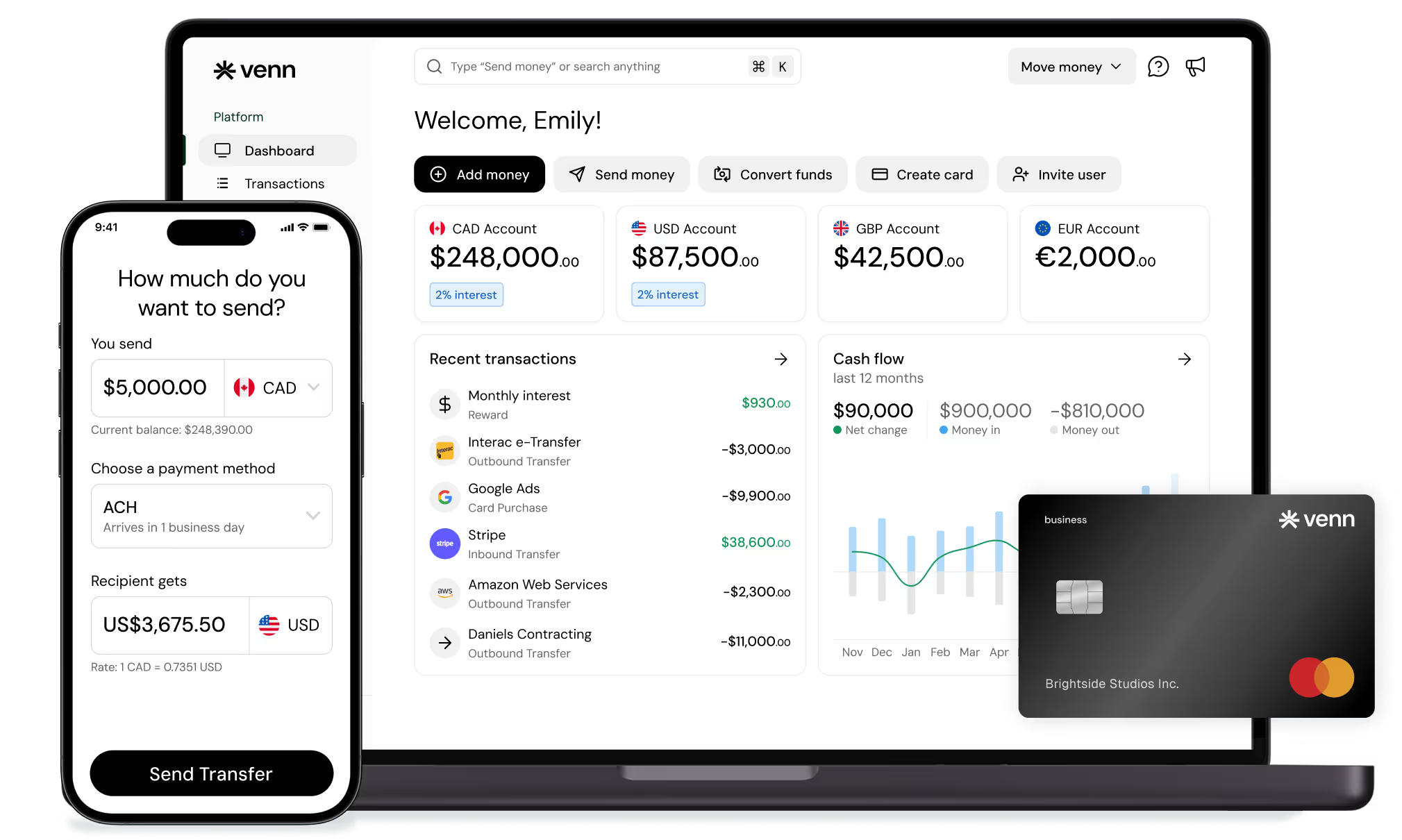13 Things You Can Write Off as a Canadian Business Owner
Discover what you can write off as a business owner. Maximize tax deductions for expenses like marketing, software, meals, and office supplies.


Trusted by 5,000+ Canadian businesses
Business banking for Canada
Local CAD and USD accounts, corporate cards with cashback, the lowest FX rates in Canada, free local transfers, and more.
What if we told you that trimming your next tax bill was as simple as tracking the day-to-day costs? Smart write-offs, or deductions, reduce taxable income such that you have to pay tax on a smaller amount. This means you have more cash left in your business to build product, hire, and market effectively.
We aim to cover the most common expenses that Canadian owners can claim, including supplies, home office expenses, vehicle costs, travel & meals, and other related expenses. All of these expenses come under the spectrum of CRA (Canada Revenue Agency) rules & regulations. In short, these expenses should be reasonable, directly linked to the earned income, and properly documented.
Things to Write Off as a Canadian Business Owner
1. Home Office Deduction
Work from home? You can claim business-use-of-home expenses. It aims to cover a reasonable share of rent, utilities, maintenance, and internet.
To qualify, your expenses must be business-related. Moreover, your workspace should be the primary location of your business or a space you use exclusively to earn business income and meet clients regularly.
The CRA asks you to calculate the deductible portion on a regular basis; typically, this is the workspace area divided by the total home area. Moreover, the claim should not create or increase business loss (according to Form T2125).
2. Business Supplies and Equipment
Here, eligible write-offs include the items you actually use to run your business, including office furniture, computers & monitors, phones, printers, and software subscriptions. In this case, specialized tools are also important, such as power tools for contractors or professional cameras for agencies.
Some of these purchases can be expensed in the year they are made. At the same time, larger assets are usually deducted over time through CCA or depreciation. These expenses require proper documentation and must align with the business purpose. It is essential to maintain accurate records by capturing invoices, tagging purchases, and tracking assets.
You can use Venn’s automated reconciliation feature and two-way sync to Xero & QuickBooks to make everything audit-ready.
3. Travel and Transportation
These expenses can include vehicle usage for business, hotels, flights, and local transport while you are away for business. Meals on business trips are typically only 50% deductible. Therefore, you should keep those receipts handy. It is essential to note that personal travel is not tax-deductible. Therefore, you should separate personal & business legs and keep a logbook for vehicle use to support your claim.
Wondering how to calculate vehicle write-offs? Check out our guide on how to write off your car as a business expense.
Venn helps make record-keeping accurate and simple. You only need to attach receipts to transactions, categorize transportation spend, and sync everything to Xero or QuickBooks for audit-ready reports.
Track trips and transportation expenses in Venn so tax time is just a quick export—not a paper chase.
4. Meals and Entertainment
Meals and entertainment for bona fide business purposes are deductible. Still, these can be limited by certain rules. In most cases, only 50% of the cost of food, beverages, and entertainment is deductible, calculated on the lesser of what you paid or a reasonable amount.
Examples that generally qualify include meals during client meetings, working dinners while traveling for business, or meals at conferences where you’re conducting business; not personal or social outings.
To protect the deduction, keep detailed records, including itemized receipts, the date, location, attendees, and the business purpose. Solid documentation reduces the risk of adjustments if you are reviewed or audited.
5. Employee Salaries and Benefits
You can generally write off what you pay your team. That includes wages and salaries (regular pay, overtime, vacation, bonuses) plus employer-paid benefits such as your share of CPP/QPP and EI, qualifying health/dental plan premiums (PHSPs), and employer contributions to a registered pension plan (RPP).
To calculate and report: total gross wages and taxable benefits, add your employer portions of CPP/EI, and include any employer pension contributions; keep payroll records for six years for audit support.
Keep this simple with Venn. We help automate payroll tracking and map deductions to the right accounts with real-time sync, so your books stay clean and filing-ready.
6. Contractor and Freelancer Payments
Payments to contractors and freelancers are deductible. They should be reasonable and inclined to earn business income, like marketing and design work, consulting, bookkeeping, and web development.
As the payer, you are required to issue T4A slips reporting fees for services, typically when total payments to a recipient exceed CAD $500 in the calendar year, and provide them (and the T4A Summary) to the CRA by the last day of February.
If you wish to make reporting painless, track every contractor invoice and payment throughout the year. Venn helps by syncing transactions with QuickBooks and Xero and automating reconciliation.
7. Marketing and Advertising Expenses
Eligible write-offs typically include paid search and social ads, print or out-of-home ads, website development/hosting, landing pages, graphic design, brochures/flyers, and video or radio spots. They also include campaign collateral, such as promotional materials.
To claim them, the costs must align with the business purpose and be directly related to earning business income.
Make the deduction easy at year-end. Use Venn to tag and categorize ad spend automatically with two-way sync to QuickBooks and Xero, real-time reconciliation, and clear audit trails.
8. Professional Services
These include fees you pay to accountants, bookkeepers, consultants, and lawyers for work that helps you earn business income. These are generally deductible. Think bookkeeping, year-end financial statements, tax return preparation, contract drafting/review, collections, and CRA objections/appeals. Claim them under Line 8860 – Professional fees (Form T2125).
To be audit-ready, keep invoices, engagement letters, and proof of payment, and retain records for at least six years. All of these require proper documentation.
You can also review service agreements regularly to ensure that the scope is business-related. For cleaner filing, tag these expenses as you go with categorized transactions and two-way sync.
9. Education and Training
Courses, seminars, and industry certifications that maintain or upgrade skills you use to earn business income are generally deductible. For example, a QuickBooks course, a compliance seminar, or an industry recertification exam prep is fit for these expenses.
What doesn’t qualify? Training for personal development or to enter a new, unrelated field. The expense must be directly tied to your current business activities and be reasonable.
Keep invoices, course agendas, proof of payment, and notes on business purpose, and retain them for six years in case the CRA asks.
10. Interest on Business Loans
Interest on money you borrow to run your business is generally deductible. Think: a term loan for equipment, a line of credit used for inventory, or a vehicle loan for a company truck.
The key test is use. The funds must be used to earn business income. If a loan is mixed personal/business, only the business portion is deductible. Keep documentation and apportion carefully to avoid issues at tax time.
Make the deduction easy to support by tracking principal versus interest and consistently tagging transactions. Venn’s two-way sync and real-time reconciliation help you categorize interest accurately and keep audit-ready records.
11. Insurance Premiums
You can deduct business insurance premiums you pay to earn income, such as general liability and property insurance on buildings, machinery, and equipment used in your business. Provincial workers’ compensation premiums paid by employers are also deductible as part of employee-related costs.
What you can’t deduct is personal insurance. Only the business-use portion qualifies (for example, auto insurance belongs under motor-vehicle expenses; home insurance is prorated under business-use-of-home). Maintain clear allocations to ensure you only claim the eligible business share.
Tip: Review policies annually to confirm coverage aligns with operations and that you’re capturing all eligible deductions in the right categories at tax time.
12. Bad Debts
Bad debts are amounts you previously recognized as revenue that have become uncollectible. Think of the unpaid invoices you have determined won’t be recovered. The CRA lets you deduct a bad debt when the receivable was already included in income and you determine it’s a bad debt in that year.
Before writing off, keep evidence of reasonable collection efforts, including reminder emails and statements, follow-up calls, demand letters, payment-plan offers, or sending the account to collections. To understand how to calculate and claim bad debt, refer to our guide on calculating bad debt expense.
Venn helps you stay organized with the help of automated reporting and two-way sync, surfacing overdue invoices, tracking follow-ups, and flagging items for review. So you only claim what’s valid and keep your books clean.
13. Startup Costs
Startup costs like legal/incorporation fees, market research, website/branding, and early marketing are generally deductible. They should be reasonable and incurred after your business has started earning income.
For incorporation/organizational costs, you can deduct up to $3,000 in the first year. Any excess is added to Class 14.1 and amortized over time (5% declining-balance CCA).
Track every expense from day one, including receipts, invoices, and contracts. This helps maximize eligible write-offs and ensures audit readiness. Venn helps by organizing records and syncing transactions with QuickBooks and Xero, reducing manual errors that can jeopardize deductions.
How to Track and Report Write-Offs Accurately
- Use software to collect receipts, categorize expenses by project, and apply rules to ensure transactions post correctly the first time. With Venn, two-way sync with QuickBooks and Xero, automated reconciliation, and real-time reporting reduce manual entry and miscoding.
- Reconcile accounts monthly, scan for duplicates or missing receipts, and run category variance reports (e.g., vehicle, meals/entertainment). For cross-border spending, record transactions in the source currency and convert them consistently to ensure accurate and audit-ready deductions.
Why Business Write-Offs Matter
Business write-offs reduce taxable income. They tend to leave more after-tax cash to cover payroll, inventory, or marketing, and smooth day-to-day cash flow.
For small and mid-sized companies operating on tight margins, the smart use of deductions is a core part of their financial strategy. Just make sure you are CRA-compliant. Only claim legitimate business expenses and keep complete supporting records for audit protection requirements.
Tools like Venn help you stay accurate and audit-ready with real-time reconciliation and two-way sync to QuickBooks and Xero.
Common Mistakes to Avoid When Writing Off Business Expenses
Many business owners make the mistake of forgetting to track expenses. This could lead to missed deductions at tax time. Another common issue is incorrectly categorizing expenses, which can result in costly errors or audits. Lastly, missing deadlines for claiming deductions is a common mistake that can result in the loss of valuable tax benefits.
To avoid these mistakes, set reminders, review your financial records regularly, and consult a tax professional.
Venn’s solutions help automate and streamline tax-related tasks. They also reduce the risk of errors and simplify the process for accurate and timely deductions.
Consulting an accountant can help you avoid costly mistakes. Find out when hiring an accountant might be the right choice by reading our guide on whether you need an accountant.
Key Tax Deductions Every Business Should Know
As a Canadian business owner, there are several tax deductions you can claim to reduce your taxable income. Here are some of the most common ones:
- Home Office Expenses: If you work from home, you can deduct a portion of your rent, utilities, and internet. The CRA allows you to claim a percentage of these costs based on the size of your home office.
- Professional Services: Fees paid to lawyers, accountants, and consultants are tax-deductible. Be sure to keep records of these services for tax purposes.
- Software Subscriptions: Business-related software subscriptions (like accounting or design tools) are fully deductible.
- Marketing Costs: Advertising costs, including digital ads and print materials, are deductible. This helps reduce the overall cost of promoting your business.
- Employee Benefits: Contributions to employee health plans, pension plans, and other benefits can also be written off.
Take Control of Your Finances with Venn
Venn is a complete financial solution designed to make managing your business finances easier than ever. It simplifies bookkeeping, automates foreign exchange (FX) tracking, and centralizes all your business expenses on a single platform. As a PSP in Canada your funds are protected under CDIC insurance meaning you have protection up to $100,000.
With real-time reconciliation, you’ll always have an up-to-date view of your finances. Venn’s multi-currency support enables you to manage international transactions with ease. At the same time, integrations with QuickBooks or Xero ensure your financial data is always synced and accurate.
Venn helps business owners stay audit-ready by providing clean, categorized transaction data.
Take control of your finances and improve your financial management with Venn.
Get started today to simplify bookkeeping and attain long-term financial success.

Key Takeaways
- Track everyday expenses — Keeping a close eye on your business expenses throughout the year ensures you can claim all eligible deductions and avoid surprises at tax time.
- Home office and business supplies — Deduct expenses like home office costs, software subscriptions, and professional services that directly support your business income.
- Employee benefits and marketing — Write off contributions to employee benefits, as well as marketing and advertising expenses, to reduce your taxable income.
Frequently Asked Questions (FAQs)
Q: Can You Write Off Your Car Expenses As A Business Owner?
Yes. Canadian business owners and self-employed individuals can write off motor vehicle expenses, but only for the portion used to earn business income. Deductible expenses include fuel, maintenance, repairs, insurance, interest on a vehicle loan, and eligible leasing costs. Crucially, you must keep detailed records (a mileage log) showing the total kilometers driven and the kilometers driven specifically for business. If your vehicle is used for both personal and business trips, you must calculate the exact business-use percentage to apply to your total operating costs.
Q: Can You Write Off Personal Expenses If You Run A Home Business?
No. Personal expenses are never tax-deductible. However, if you are a home-based business owner, you can deduct a portion of specific home-related costs, such as utilities, rent, property tax, and home insurance, as a "business-use-of-home expense." The deductible amount is calculated based on the area of your home used as your dedicated workspace (e.g., a home office) relative to the home’s total finished area, in line with specific CRA guidelines.
Q: Can You Claim A Write-Off For Business Losses In Previous Years?
Yes. The Canada Revenue Agency (CRA) allows businesses to apply a non-capital loss (which includes business operating losses) to profitable years to reduce taxable income. For losses arising in tax years ending after 2005, you can carry a non-capital loss back up to three years or carry it forward up to twenty years. For example, a business with a $20,000 non-capital loss in 2024 can use that loss to offset taxable profits earned in 2021, 2022, 2023, or any future year up to 2044.
Venn is all-in-one business banking built for Canada
From free local CAD/USD accounts and team cards to the cheapest FX and global payments—Venn gives Canadian businesses everything they need to move money smarter. Join 5,000+ businesses today.

Frequently asked questions
Everything you need to know about the product and billing.
Venn is the cheapest and easiest way to manage your business banking needs. We offer the best currency exchange rates in Canada, chequing accounts in multiple currencies, domestic and international bank transfers, and a corporate Mastercard to manage all your spend. By signing up to Venn you automatically get:
- Accounts in Canadian dollars, US dollars, British pounds, and Euros
- The cheapest FX rates in Canada with free domestic transfers (EFT, ACH, SEPA, FPS)
- A Mastercard Corporate card that gets you the same great FX rates and cashback with no minimum spend requirements
Yes, Venn holds eligible deposits at our Partner Institution in our trust accounts, including deposits in foreign currencies. CDIC protects eligible deposits up to CA$100,000 per deposit category per CDIC member institution.
No, we don’t have any hidden fees! All charges, including currency conversion and premium plans, are clear and transparent. You can even issue unlimited corporate cards to your team and sign up with a free plan in minutes! Learn more about our transparent Pricing.
Nope! Other companies and traditional bank accounts have high minimum balance requirements. This makes accounts inaccessible for small businesses or individuals. Venn does not require a minimum balance. Your CAD and USD funds will also earn 2% interest regardless of the balance.
Our process is quick — Customers typically get set up in 5 minutes or less! Create a free account and start saving with no monthly fees, cashback on card spend, and the best FX rates around.
Of course! Our friendly Support specialists are available via Chat or Email 24 hours a day, 7 days a week, 365 days a year. All tickets are monitored and responded to within 24 hours, with an average response time of 30 minutes.
Yes, we have a direct integration with QBO and Xero. We are working on more integrations very soon!
Join 5,000+ businesses banking with Venn today
Streamline your business banking and save on your spend and transfers today
No personal credit check or guarantee.


